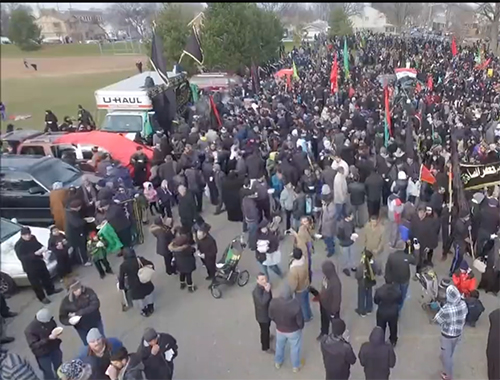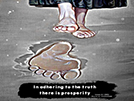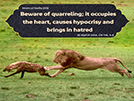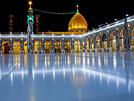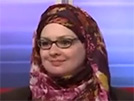Chapter Five
- Details
- Hits: 4600
Chapter Five
ON THE EXCELLENCE OF THE BELIEVER, GOOD MANNERS, AND THE EXCELLENCE OF HIM WHOSE NAME IS MOHAMMED OR AHMED
81. Through his chain of authorities, he, peace be on him, said: [Allah's Messenger, may Allah bless him and his family, said:] "The likeness of the believer with Allah is like an angel brought nigh; and the believer with Allah is better than an angel brought nigh; and there is nothing more lovable to Allah than a repentant believing man or a repentant believing woman."
82. Through his chain of authorities, he, peace be on him, said: [Allah's Messenger, may Allah bless him and his family, said:] "Verily, the believer is recognized in the heaven as a man is recognized by his own family and children; and he is nobler with Him (Allah) than an angel brought nigh."
83. Through his chain of authorities, he, peace be on him, said: [Allah's Messenger, may Allah bless him and his family, said:] "Gabriel came to me from his Lord and said: 'My Lord, the Great and Almighty, recites to you (His) greetings and says: 'O Mohammed, give good news to the believers¾who do good deeds, believe in you, and love your household¾of the Garden, for they have with Me good reward, and they will enter the Garden.'" The believers who have such qualities will have the noblest rank in the Garden and live therein wherever they like.
84. Through his chain of authorities, he, peace be on him, said: [Allah's Messenger, may Allah bless him and his family, said:] "He who treats men and does not wrong them; tells them (about something) and does not tell them lies; promises them and does not break (his promise toward) them is a believer whose manhood is perfect, whose justice is manifest, love for him is obligatory (on men), and it is forbidden (on them) to backbite him."
If man has such qualities, he is perfect in faith, manhood, justice; and it is obligatory on people to be loyal to him and to refrain from backbiting him.
85. Through his chain of authorities, he, peace be on him, said: [Allah's Messenger, may Allah bless him and his family, said:] "He who slanders a believing man or a believing woman or says about them what they do not have, Allah will make him stand on a hill of fire until he abandons what he has said concerning them."
Definitely, the believer has sacredness with Allah, for He, the Exalted, has made it incumbent on men to respect him, so none has the right to disparage him or to defame his character.
86. Through his chain of authorities, he, peace be on him, said: [Allah's Messenger, may Allah bless him and his family, said:] "An example of the believer's dignity with Allah is that Allah does not appoint a term for his span of life. However, if he concerns about an offense, Allah makes him die due to (His) mercy (toward him)."
The meaning of this tradition is that Allah prolongs the believer's life, but if he commits a sin, Allah decreases his life. Ima`m al-Rida` said: "Refrain from offenses and Allah will prolong your span of life."
87. Through his chain of authorities, he, peace be on him, said: [Allah's Apostle, may Allah bless him and his family, said:] "Cling to good manners, for the well-mannered are certainly in the Garden."
One of the most important Islamic principles is good manners, and it is one of the most beautiful and perfect qualities of the Prophet, may Allah bless him and his family, by which he was distinguished from the rest of the prophets. Islam has emphasized on the necessity of having such a noble quality. During their Bedouin life, nations were distinguished from each other by their bodily strength. When they progressed, they were distinguished from each other by their knowledge. And when they advanced, they were distinguished from one another by good manners.
88. Through his chain of authorities, he, peace be on him, said: [Allah's Messenger, may Allah bless him and his family, said:] "If the servant knows what he will have due to good manners, then he will come to know that he is in no need (of anything) except good manners."
In this tradition there is a summons to clinging to good manners and Allah, the Most High, has prepared abundant reward for him who has this noble quality.
89. Through his chain of authorities, he, peace be on him, said: [Allah's Apostle, may Allah bless him and his family, said:] "When the Day of Resurrection occurs, Allah will manifest Himself to His servant and shows him his sins one by one, and then He will forgive him. Allah will not inform about the servant's sins neither an angel brought nigh nor a messenger sent out. He will cover them from everyone, and then he will say to them: 'Be good deeds!'"
This traditions gives an account of Allah's plentiful mercy and his inclusive pardon toward His sinful servants. We ask Him, the Most High, to include us in His mercy.
90. Through his chain of authorities, he, peace be on him, said: [Allah's Messenger, may Allah bless him and his family, said:] "He who abases and degrades a believing man or a believing woman because of their poverty, Allah will disgrace him on the Day of Resurrection."
Among the sins for which Allah punishes men is abasing and insulting the believer, for Allah has raised his importance and exalted his rank; therefore he who disdains the believer disdains Allah, the Exalted.
91. Through his chain of authorities, he, peace be on him, said: [Allah's Messenger, may Allah bless him and his family, said:] "Verily, through good manners the servant gains the rank of one who performs prayer and fasting."
The Prophet, may Allah bless him and his family, has underlined the necessity of having this noble quality, through which the Muslim is exalted and by which he is distinguished from the rest of men.
92. Through his chain of authorities, he, peace be on him, said: [Allah's Messenger, may Allah bless him and his family, said:] "Nothing heavier in the Balance than good manners."
93. Through his chain of authorities, he, peace be on him, said: [Allah's Messenger, may Allah bless him and his family, said:] "Bad manners spoil action just as vinegar spoils honey." The Prophet, may Allah bless him and his family, warned men against bad manners which throw man into dreadful evil as well as they spoil the good deeds which he does.
94. Through his chain of authorities, he, peace be on him, said: ['Ali b. Abu` Ta`lib, peace be on him, related to me:] "Among the treasures of good is concealing deed and steadfastness toward misfortune."
This noble quality is one of the most distinguished qualities of man. It is among the treasures of good and is proof of high character.
95. Through his chain of authorities, he, peace be on him, said: ['Ali b. Abu` Ta`lib, peace be on him, related to me. He said:] "Good manners are the best friend; the most perfect of you in belief is the best of you in manners."
Surely, good manners are the best friend and guard, for they protect man from many problems and difficulties. In the meantime they are proof of the perfect faith of a person.
96. Through his chain of authorities, he, peace be on him, said: [Allah's Messenger, may Allah bless him and his family, said:] "The title of the Muslim's page is good manners."
Good manners are the most prominent quality in the Muslim's character, as the Prophet, may Allah bless him and his family, said to his community.
97. Through his chain of authorities on the authority of Ima`m 'Ali, the Commander of the faithful, peace be on him, who said: [Allah's Apostle was asked:] "Who enter the Garden more?" "(Those who have) reverential fear and good manners," he replied. Then he was asked: "Who enter the Fire more?" "(Those who follow) the two hollow (organs): the stomach and the genital parts," he answered.
Fear of Allah, refraining from disobeying Him, and having good manners are the firmest ways through which man gains Allah's good pleasure and enters the Garden. Likewise, paying no attention to the forbidden things and having an unlawful sexual intercourse bring about entering the Fire.
98. Through his chain of authorities, he, peace be on him, said: [Allah's Messenger, may Allah bless him and his family, said:] "The nearest of you to me in sitting on the Day of Resurrection are those who are the best of you in good manners, and the best of you is he who is the best of you (in good manners) toward his family."
He who beautifies himself with good manners is the closest of all people to the greatest Prophet, may Allah bless him and his family, on the Day of Resurrection. Likewise, the closest of people to Allah's Messenger, may Allah bless him and his family, is he who shows good, mercy, and kindness toward his family and undertakes their affairs.
99. Through his chain of authorities, he, peace be on him, said: [Allah's Messenger, may Allah bless him and his family, said:] "The best of the people in faith are the best of them in good manners and the gentlest of them toward their families, and I am the gentlest of you toward my family."
This tradition emphasizes good manners and kindness to family, and this is among the qualities of the holy Prophet, may Allah bless him and his family.
100. Through his chain of authorities, he, peace be on him, said: [Allah's Messenger, may Allah bless him and his family, said:] "When you name the boy Mohammed, then honor him, make room for him when sitting, and do not show an ugly face toward him."
Islam has made it recommended for Muslims to name their boy babies with the name of the Prophet Mohammed, may Allah bless him and his family. He who is given this name is worthy of honoring, magnifying, making room during sitting, and receiving with cheerfulness.
101. Through his chain of authorities, he, peace be on him, said: [Allah's Messenger, may Allah bless him and his family, said:] "If some people have a consultation and someone whose name is Mohammed or Ahmed is present with them and they let him take part in the consultation, they will (face nothing) except good for them."
This tradition summons Muslims to name their boys with the name of the great Prophet, may Allah bless him and his family, and it urges them to honor and magnify those boys who have given this blessed name.
102. Through his chain of authorities, he, peace be on him, said: [Allah's Messenger, may Allah bless him and his family, said:] "If food is placed and someone whose name is Mohammed or Ahmed sits at it, Allah will sanctify that house twice a day."
83. Through his chain of authorities, he, peace be on him, said: [Allah's Messenger, may Allah bless him and his family, said:] "Gabriel came to me from his Lord and said: 'My Lord, the Great and Almighty, recites to you (His) greetings and says: 'O Mohammed, give good news to the believers¾who do good deeds, believe in you, and love your household¾of the Garden, for they have with Me good reward, and they will enter the Garden.'" The believers who have such qualities will have the noblest rank in the Garden and live therein wherever they like.
84. Through his chain of authorities, he, peace be on him, said: [Allah's Messenger, may Allah bless him and his family, said:] "He who treats men and does not wrong them; tells them (about something) and does not tell them lies; promises them and does not break (his promise toward) them is a believer whose manhood is perfect, whose justice is manifest, love for him is obligatory (on men), and it is forbidden (on them) to backbite him."
If man has such qualities, he is perfect in faith, manhood, justice; and it is obligatory on people to be loyal to him and to refrain from backbiting him.
85. Through his chain of authorities, he, peace be on him, said: [Allah's Messenger, may Allah bless him and his family, said:] "He who slanders a believing man or a believing woman or says about them what they do not have, Allah will make him stand on a hill of fire until he abandons what he has said concerning them."
Definitely, the believer has sacredness with Allah, for He, the Exalted, has made it incumbent on men to respect him, so none has the right to disparage him or to defame his character.
86. Through his chain of authorities, he, peace be on him, said: [Allah's Messenger, may Allah bless him and his family, said:] "An example of the believer's dignity with Allah is that Allah does not appoint a term for his span of life. However, if he concerns about an offense, Allah makes him die due to (His) mercy (toward him)."
The meaning of this tradition is that Allah prolongs the believer's life, but if he commits a sin, Allah decreases his life. Ima`m al-Rida` said: "Refrain from offenses and Allah will prolong your span of life."
87. Through his chain of authorities, he, peace be on him, said: [Allah's Apostle, may Allah bless him and his family, said:] "Cling to good manners, for the well-mannered are certainly in the Garden."
One of the most important Islamic principles is good manners, and it is one of the most beautiful and perfect qualities of the Prophet, may Allah bless him and his family, by which he was distinguished from the rest of the prophets. Islam has emphasized on the necessity of having such a noble quality. During their Bedouin life, nations were distinguished from each other by their bodily strength. When they progressed, they were distinguished from each other by their knowledge. And when they advanced, they were distinguished from one another by good manners.
88. Through his chain of authorities, he, peace be on him, said: [Allah's Messenger, may Allah bless him and his family, said:] "If the servant knows what he will have due to good manners, then he will come to know that he is in no need (of anything) except good manners."
In this tradition there is a summons to clinging to good manners and Allah, the Most High, has prepared abundant reward for him who has this noble quality.
89. Through his chain of authorities, he, peace be on him, said: [Allah's Apostle, may Allah bless him and his family, said:] "When the Day of Resurrection occurs, Allah will manifest Himself to His servant and shows him his sins one by one, and then He will forgive him. Allah will not inform about the servant's sins neither an angel brought nigh nor a messenger sent out. He will cover them from everyone, and then he will say to them: 'Be good deeds!'"
This traditions gives an account of Allah's plentiful mercy and his inclusive pardon toward His sinful servants. We ask Him, the Most High, to include us in His mercy.
90. Through his chain of authorities, he, peace be on him, said: [Allah's Messenger, may Allah bless him and his family, said:] "He who abases and degrades a believing man or a believing woman because of their poverty, Allah will disgrace him on the Day of Resurrection."
Among the sins for which Allah punishes men is abasing and insulting the believer, for Allah has raised his importance and exalted his rank; therefore he who disdains the believer disdains Allah, the Exalted.
91. Through his chain of authorities, he, peace be on him, said: [Allah's Messenger, may Allah bless him and his family, said:] "Verily, through good manners the servant gains the rank of one who performs prayer and fasting."
The Prophet, may Allah bless him and his family, has underlined the necessity of having this noble quality, through which the Muslim is exalted and by which he is distinguished from the rest of men.
92. Through his chain of authorities, he, peace be on him, said: [Allah's Messenger, may Allah bless him and his family, said:] "Nothing heavier in the Balance than good manners."
93. Through his chain of authorities, he, peace be on him, said: [Allah's Messenger, may Allah bless him and his family, said:] "Bad manners spoil action just as vinegar spoils honey." The Prophet, may Allah bless him and his family, warned men against bad manners which throw man into dreadful evil as well as they spoil the good deeds which he does.
94. Through his chain of authorities, he, peace be on him, said: ['Ali b. Abu` Ta`lib, peace be on him, related to me:] "Among the treasures of good is concealing deed and steadfastness toward misfortune."
This noble quality is one of the most distinguished qualities of man. It is among the treasures of good and is proof of high character.
95. Through his chain of authorities, he, peace be on him, said: ['Ali b. Abu` Ta`lib, peace be on him, related to me. He said:] "Good manners are the best friend; the most perfect of you in belief is the best of you in manners."
Surely, good manners are the best friend and guard, for they protect man from many problems and difficulties. In the meantime they are proof of the perfect faith of a person.
96. Through his chain of authorities, he, peace be on him, said: [Allah's Messenger, may Allah bless him and his family, said:] "The title of the Muslim's page is good manners."
Good manners are the most prominent quality in the Muslim's character, as the Prophet, may Allah bless him and his family, said to his community.
97. Through his chain of authorities on the authority of Ima`m 'Ali, the Commander of the faithful, peace be on him, who said: [Allah's Apostle was asked:] "Who enter the Garden more?" "(Those who have) reverential fear and good manners," he replied. Then he was asked: "Who enter the Fire more?" "(Those who follow) the two hollow (organs): the stomach and the genital parts," he answered.
Fear of Allah, refraining from disobeying Him, and having good manners are the firmest ways through which man gains Allah's good pleasure and enters the Garden. Likewise, paying no attention to the forbidden things and having an unlawful sexual intercourse bring about entering the Fire.
98. Through his chain of authorities, he, peace be on him, said: [Allah's Messenger, may Allah bless him and his family, said:] "The nearest of you to me in sitting on the Day of Resurrection are those who are the best of you in good manners, and the best of you is he who is the best of you (in good manners) toward his family."
He who beautifies himself with good manners is the closest of all people to the greatest Prophet, may Allah bless him and his family, on the Day of Resurrection. Likewise, the closest of people to Allah's Messenger, may Allah bless him and his family, is he who shows good, mercy, and kindness toward his family and undertakes their affairs.
99. Through his chain of authorities, he, peace be on him, said: [Allah's Messenger, may Allah bless him and his family, said:] "The best of the people in faith are the best of them in good manners and the gentlest of them toward their families, and I am the gentlest of you toward my family."
This tradition emphasizes good manners and kindness to family, and this is among the qualities of the holy Prophet, may Allah bless him and his family.
100. Through his chain of authorities, he, peace be on him, said: [Allah's Messenger, may Allah bless him and his family, said:] "When you name the boy Mohammed, then honor him, make room for him when sitting, and do not show an ugly face toward him."
Islam has made it recommended for Muslims to name their boy babies with the name of the Prophet Mohammed, may Allah bless him and his family. He who is given this name is worthy of honoring, magnifying, making room during sitting, and receiving with cheerfulness.
101. Through his chain of authorities, he, peace be on him, said: [Allah's Messenger, may Allah bless him and his family, said:] "If some people have a consultation and someone whose name is Mohammed or Ahmed is present with them and they let him take part in the consultation, they will (face nothing) except good for them."
This tradition summons Muslims to name their boys with the name of the great Prophet, may Allah bless him and his family, and it urges them to honor and magnify those boys who have given this blessed name.
102. Through his chain of authorities, he, peace be on him, said: [Allah's Messenger, may Allah bless him and his family, said:] "If food is placed and someone whose name is Mohammed or Ahmed sits at it, Allah will sanctify that house twice a day."


